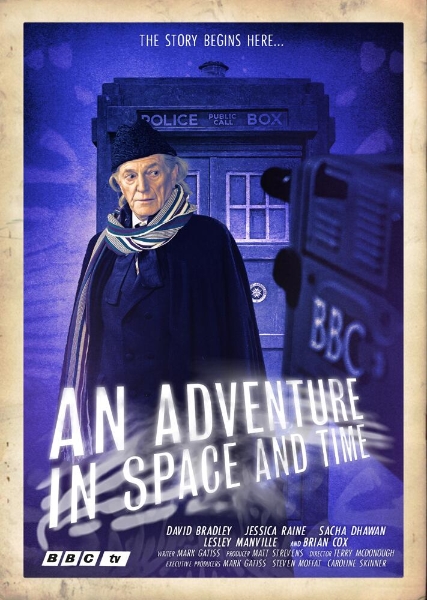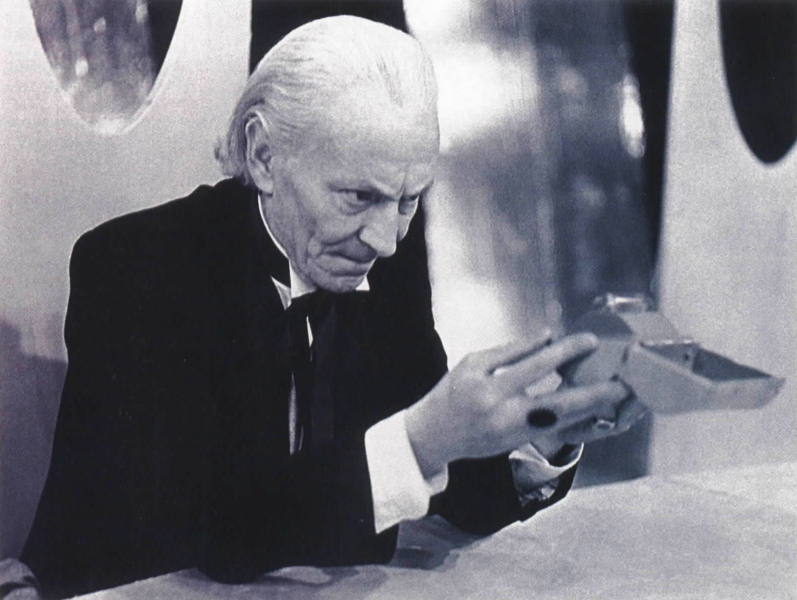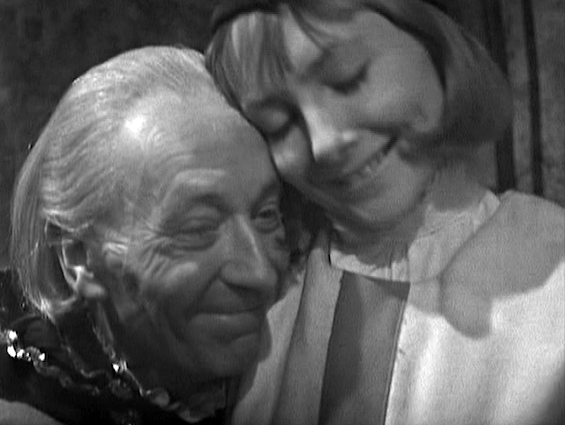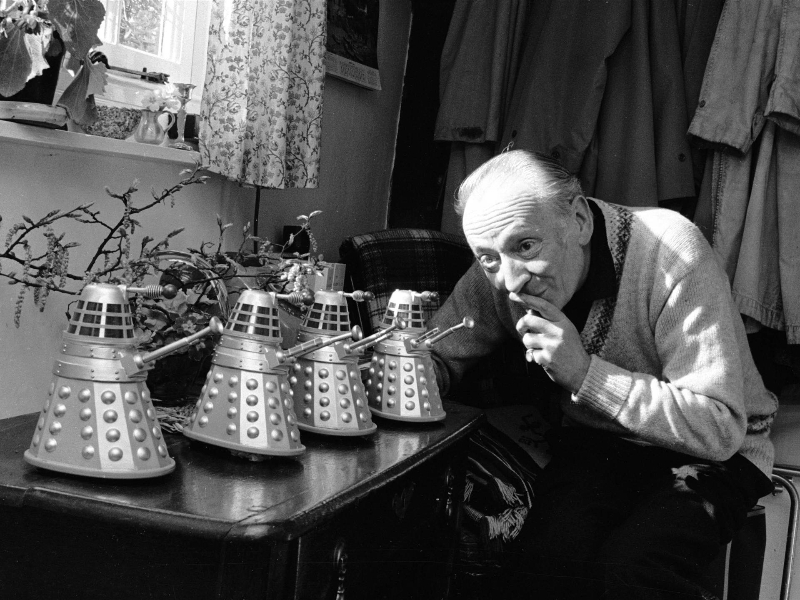 Later this month, the BBC will air a special docudrama about the origin and production of the sci-fi series Doctor Who. Adventures in Space and Time stars David Bradley, as William Hartnell and recreates the 1960s era British Broadcasting Corporation behind the scenes. However, writer and long time fan, Mark Gatiss, is expecting a fan backlash and “howls of protest” toward what he has described as his “love letter” to the show. The script cuts some key moments and characters involved in the show’s beginnings such as script editor, David Whitaker.
Later this month, the BBC will air a special docudrama about the origin and production of the sci-fi series Doctor Who. Adventures in Space and Time stars David Bradley, as William Hartnell and recreates the 1960s era British Broadcasting Corporation behind the scenes. However, writer and long time fan, Mark Gatiss, is expecting a fan backlash and “howls of protest” toward what he has described as his “love letter” to the show. The script cuts some key moments and characters involved in the show’s beginnings such as script editor, David Whitaker.
“Writing Doctor Who, you don’t give a monkey’s. You write it for your audience, not for the people who will watch it anyway. Doctor Who fans exist for the minutiae. They’ll complain about everything. They’ll probably complain about Verity Lambert’s shoes. But I made it for everybody and I hope it’s very touching. I don’t mean to sound contemptible at all – I’m a fan so there are a lot of things that I want to nod to or embrace – but you can’t be ruled by that. Here, this is holy writ; they’re real people.”
It’s easy for Gatiss to feel that way. After all, he is a fan who is writing for the show and working in the television industry, whereas 99% of fans are not. But that doesn’t mean that any fan who finds fault with his own choices, should have their opinions devalued as mere whinging. There is a lot of pettiness in all fandoms, but that doesn’t mean that those criticism aren’t sometimes justified.
 Gatiss chose to conflate Mervyn Pinfield and David Whittaker into one person. I understand the difficulty in time and narrative constraints, but actually merging two people together effectively blurs facts and changes history. While I am disappointed that this was deemed necessary, I am much more concerned about the portrayal of William Hartnell that has historically lacked a vital factual component.
Gatiss chose to conflate Mervyn Pinfield and David Whittaker into one person. I understand the difficulty in time and narrative constraints, but actually merging two people together effectively blurs facts and changes history. While I am disappointed that this was deemed necessary, I am much more concerned about the portrayal of William Hartnell that has historically lacked a vital factual component.
There is a bit of a myth surrounding Hartnell being cantankerous by his own nature and I’m concerned this will simply be perpetuated in the upcoming biopic. For anyone that has done any reading on Hartnell, they will be aware he was suffering from arteriosclerosis causing his arteries to harden and a great deal of pain. For anyone who has lived with someone suffering from a debilitating disease, or has one themselves, they will have some idea how this would have contributed to Hartnell’s occasional touchiness. Both the pain itself and the frustration that come with memory loss must have made his ability to continue as star of the show extremely challenging. He had to work a 48-50 episode per year shooting schedule. This context, I think, is crucial to giving an honest and sympathetic perspective on Hartnell that is long overdue.
 Much of the criticism that exists about Hartnell comes from a small group of people who only knew him briefly. I am sick and tired of hearing Anneke Wills’ extremely finite view on Hartnell. Together with Michael Craze, she was the last co-star to work with Hartnell on the show. Considering everything that had been going on behind the scenes during the tumultuous tenure of John Wiles and Donald Tosh that directly preceded them, WIlls never had the full picture. She only recorded three serials with Hartnell before he was forced to leave the show, so her judgments on the actor have always been very narrowly biased all these years.
Much of the criticism that exists about Hartnell comes from a small group of people who only knew him briefly. I am sick and tired of hearing Anneke Wills’ extremely finite view on Hartnell. Together with Michael Craze, she was the last co-star to work with Hartnell on the show. Considering everything that had been going on behind the scenes during the tumultuous tenure of John Wiles and Donald Tosh that directly preceded them, WIlls never had the full picture. She only recorded three serials with Hartnell before he was forced to leave the show, so her judgments on the actor have always been very narrowly biased all these years.
Before Anneke Wills arrived, producer John Wiles and script editor Donald Tosh had been actively trying to get Hartnell removed from the show. Neither of them cared for the show in its current format and Hartnell did not agree with their plan for future. The actor presented a major obstacle to their television ambitions. Hartnell was not alone in giving them feedback they disagreed with. They effectively fired Maureen O’Brien, the actress that played Viki, reportedly upsetting Hartnell and no doubt contributing to the flame up that occurred between him and the producer during Master Plan.
 There was a LOT of drama behind the drama, and my fear is that the comments by actors and people who came into the show fleetingly, or late during Hartnell’s era, never had the bigger picture. And today, their comments continue to provide only half truths about the man himself. It’s important, in my view, that something of this is addressed, even if it is simply the mention of his battle with a debilitating disease. I think it helps paint a much more heroic view of Hartnell than the often simplified one that has proliferated over the years.
There was a LOT of drama behind the drama, and my fear is that the comments by actors and people who came into the show fleetingly, or late during Hartnell’s era, never had the bigger picture. And today, their comments continue to provide only half truths about the man himself. It’s important, in my view, that something of this is addressed, even if it is simply the mention of his battle with a debilitating disease. I think it helps paint a much more heroic view of Hartnell than the often simplified one that has proliferated over the years.
I am very excited to see Hartnell, and an era of Doctor Who that I hold in such esteem, being celebrated with a special television drama on the show’s 50th anniversary. I just hope that it manages to present Hartnell’s passion for the program along with his health struggle.
